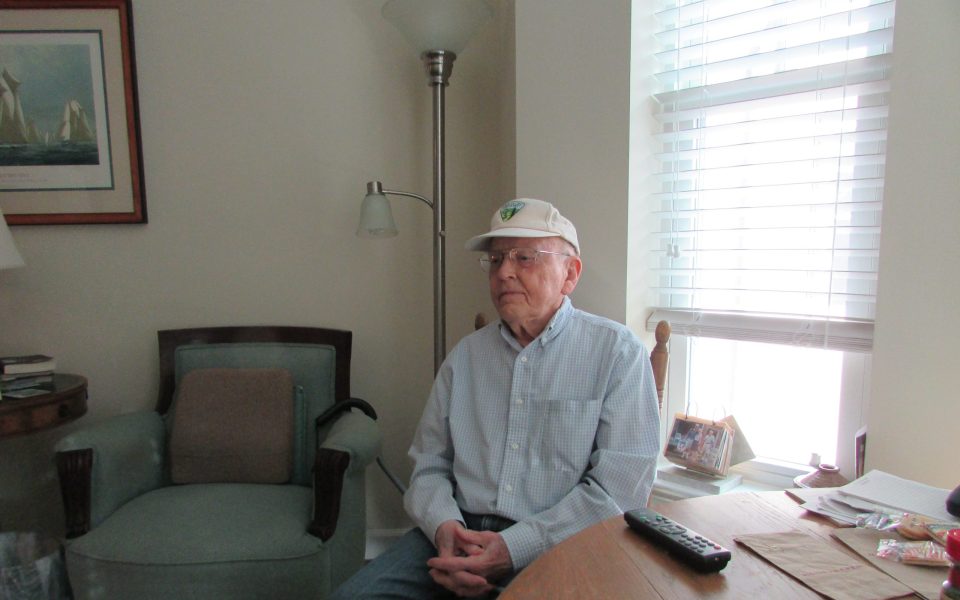The names of the comrades lost in battle, mainly fellow pilots, have slipped from his memory over the years.
“I often wonder if this is a subliminal effort to erase all of this,” Anthony Lynch mused. “I think you tend to stay off the things that were disturbing or unpleasant. And that’s probably for the best.”
The 93-year-old resident of the Arbor Acres assisted-living community in Winston-Salem recalls his service as a Navy pilot in World War II with a decidedly unfussy sense of equanimity. It wasn’t really a choice to enlist on the day after his 18th birthday, which came a week after the Imperial Japanese Navy Air Service carried out a devastating attack on Pearl Harbor on Dec. 7, 1941. And during his combat duty in the Pacific he never took it for granted that he would come back alive. That he did he largely chalks up to luck.
When President Truman made the decision to drop the atomic bomb on Hiroshima and Nagasaki in August 1945, hastening the close of the war, the pilots were among the first to be discharged because of the expense of their combined officer and flight pay. Lynch was eager to enroll in college under the GI Bill, but he had about two months free before the start of classes.
“What I did was to visit the parents of the guys that we had lost that I knew the best,” Lynch said. “Just to sit with them and talk about what he was doing and what we thought of him. I was really impressed. I thought I was going to have a lot of trouble, but they were glad to see me. That was my form of grieving, just sharing it with them.”
Lynch spent the war carrying out bombing raids on Japanese-occupied islands (to soften them up in advance of the Marine assaults) and searching for US B-29s that went down in the Pacific returning from bombing runs to Tokyo.
Lynch’s plane was equipped with neither radio nor radar, which meant that the only way to carry out a bombing raid and get back to the aircraft carrier was to regularly consult his compass and keep charts while flying. Meanwhile, the wind might bump the plane to the side, and the carrier moved simultaneously. Lynch wound up relying on his experience sailing as a child in the Long Island Sound to learn how to assess the wind and waves for accurate navigation.
“Once I began to comprehend aerial navigation I didn’t think I was going to make it,” he recalled. “I still think it was that early experience of sailing that was invaluable. Quite a few of the pilots didn’t make it. In great measure, most of them were excellent pilots. They hadn’t had the experience around the water that I had.
“These poor guys they took off the farms of Iowa and Idaho, I don’t know how the hell they managed,” he added. “A lot of them didn’t.”
If a pilot went off course he might run out of fuel before he was able to return to the carrier. That would necessitate the grim secondary task of search-and-rescue.
“Those of us who got back had to go out and look for them,” Lynch said. “When you’re looking for a little, red raft in the Pacific, that’s pretty hopeless. Of course, what choice do you have? We had to try to save them if we could.”
There’s not a hint of braggadocio in Lynch’s account.
“Little things are what make the difference between making it and not making it,” he said. “Luck plays an enormous role, I think.”
Compared to today’s all-volunteer military, which is a tiny fraction of the population, service was almost automatic for Lynch’s generation. Thirteen out of 15 boys in his 8th grade graduating class went on to become pilots. Lynch’s brother in law, a fighter pilot in the Eighth Air Force, shot down five German Luftwaffe planes. His sister’s roommate in college would marry an executive officer with the USS Tang submarine, which made it into Tokyo Bay and obtained photographs of the city to use as propaganda to demoralize the enemy. A friend was shot down while bombing Axis-occupied oil fields in Romania and had to walk to Allied-controlled territory, trading religious medals for food along the way.
Although Lynch had been interested in flying since childhood, he said the military held no appeal to him up to the time of the Japanese bombing of Pearl Harbor.
“That Sunday morning changed everything,” he said. “It felt natural [to sign up]. It really did. Everybody around me was doing the same thing.”
Join the First Amendment Society, a membership that goes directly to funding TCB‘s newsroom.
We believe that reporting can save the world.
The TCB First Amendment Society recognizes the vital role of a free, unfettered press with a bundling of local experiences designed to build community, and unique engagements with our newsroom that will help you understand, and shape, local journalism’s critical role in uplifting the people in our cities.
All revenue goes directly into the newsroom as reporters’ salaries and freelance commissions.


Leave a Reply